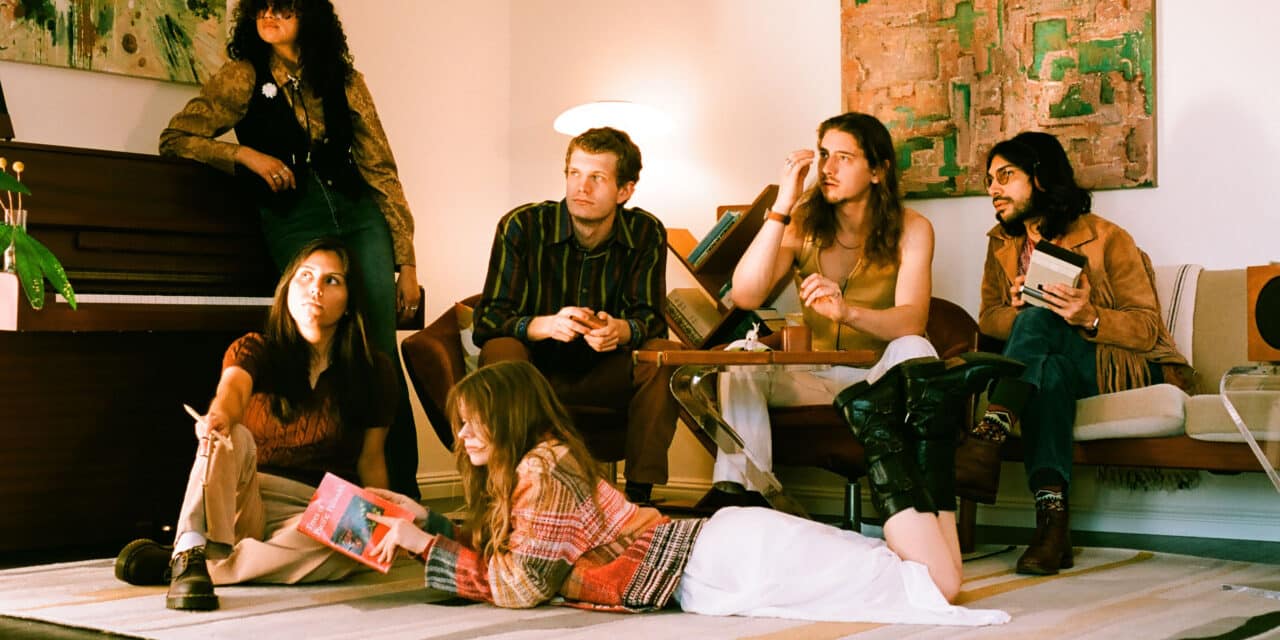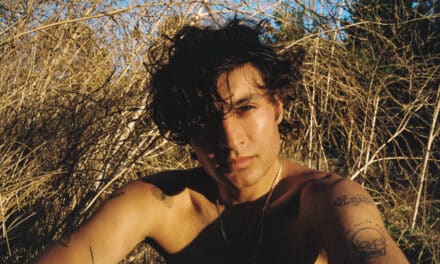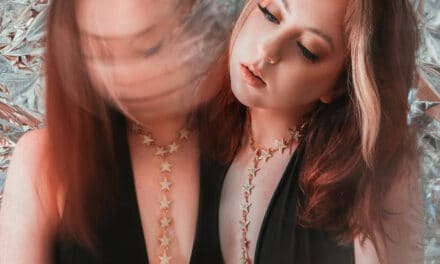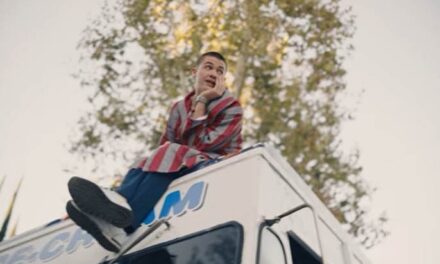photo by Nicole Vail
There’s a specific kind of magic in the Los Angeles underground — the kind that hums under neon lights, seeps through cracked amps, and lingers in the air after the last cymbal hit. That’s where badsoma were born.
Once the bedroom project of Iranian-American multi-instrumentalist Armin Fard, badsoma has since evolved into a six-piece indie rock collective defined by chemistry, rebellion, and raw sonic cohesion. Today, they officially announce their self-titled EP, arriving November 7, and offer a first taste with their lead single and video, “Coffee Pot.”
A Love Song for Lost Decades
If nostalgia had a frequency, “Coffee Pot” would be it. From its opening chords to its chaotic outro, the track drips with yearning — not only for someone, but for a moment in time.
“‘Coffee Pot’ is, in so many ways, a distillation of our sound when we recorded the EP,” the band explains. “At its core, it’s a love song, full of yearning and angst. We wanted this to remind you of a time that’s lost in your parents’ dusty cassette collection—when rock bands full of big personalities ruled the charts, and the president was a crook… well, maybe that one’s still true.”
That sense of irony — longing for the past while staring down the present — sits at the heart of badsoma’s creative world. The track debuted on It’s Psychedelic Baby Magazine, but it’s built for headphones, for late-night drives, for anyone who’s ever missed a version of themselves that no longer exists.
From One to Many
What started as Armin’s solo outlet quickly became something more — a movement of sorts. With Braden Rose on percussion and co-production duties, the duo built a foundation sturdy enough to invite new voices in.
Enter guitarist Starlit, blues-trained and emotionally unfiltered, who met Braden at the Conservatory for Recording Arts and Sciences in Arizona. She brought with her Donald Segien, a local bass player with an equal passion for groove and gin, and together they began shaping the band’s identity gig by gig.
By 2024, violinist Lindsey Hamilton and guitarist Ana Léon joined the lineup, completing a sound that feels lush, cinematic, and alive — part post-punk drive, part classic rock melodrama, all heart.
Built on Collaboration and Conscience
Recorded primarily at MooseCat Recording in Los Angeles, with additional production from Armin’s Long Beach home studio, badsoma’s self-titled EP is the sound of collective authorship. Each track pulses with environmental and political consciousness, but never loses the intimacy of personal storytelling.
The group’s philosophy is clear: music as conversation, creation as community. Every member contributes not only notes but perspectives — weaving individual experiences into something that feels both deeply personal and beautifully communal.
The Next Wave
Following the success of their 2022 EP Kicking and Screaming — which cracked the NACC Top 200 and climbed to #2 on KCSB’s Hit List — badsoma’s latest chapter is one of self-definition. They’ve built momentum not through hype but through connection — between sound and story, between the personal and the political, between the now and the never-again.
With their self-titled EP, badsoma aren’t just releasing new songs — they’re opening a new portal into what modern indie rock can feel like: lived-in, layered, and defiantly human.
“Coffee Pot” feels drenched in nostalgia — like flipping through your parents’ old mixtapes. What era or sound were you trying to resurrect or reinterpret with this track?
(Starlit) We were not attempting to embody any certain era, however, we seem to naturally lean towards a 1970’s psychedelic rock feel. Many, if not all, of the songs I write are made with the rough fabric of classic blues music: dark and gritty. Paired with straight forward, melancholic imagery within the lyrics. My love for metal and its many subgenres pokes through in the form of a wild guitar solo. The band’s contributions brought a lovely softness to the song, which it was so desperately yearning for.
You describe the song as “a love song full of yearning and angst.” What does love look like to badsoma — chaos, calm, or something in between?
(Starlit) Love sits high up on the top shelf next to words like “faith” and “forever”. Difficult to wrap one’s head around, as it is intangible. Similar to faith, love remains so very real, and is a hard-to-come-by but necessary ingredient in the human experience. Just like forever, love is indefinite: surrounding us. This band is a prime example of love. In recent years for me, bands have come and gone, but badsoma has always remained consistent. We commit our time and effort into making music and product, we have practiced effective cooperation skills, working with each others’ learning styles, figuring out our moments to shine, and when to pull back and leave space for one another. Love is all of the above: it is chaotic, calm, and somewhere in between because life will give us a run for our money, but when you truly love someone, you will hang on tight through it all. Love is admiring one another’s quirks, being patient with each other’s emotions, and not only riding out tough times, but also surviving the minor inconveniences and monotony of the day to day together.
The EP feels born out of LA’s post-pandemic underground — a moment equal parts isolation and rebirth. How did the city itself shape your creative chemistry?
(Armin) Los Angeles is definitely a big part of who we are. It provides us with a community and a platform. LA is also hard to get around. The city itself can be very isolating. It’s always been a part of the band, from how and when we decide to meet, to how long we can be together in the same space. I think in some ways it shapes who we are, because it forces us to cherish the time we get to spend together.
From a solo project to a six-piece collective, your evolution seems almost cinematic. What did you gain — or lose — in that transition from one vision to many?
(Armin) Going from a solo project to the dynamic we have right now has been a process of giving up control. When I abandoned the idea of badsoma as my vision, I had a vague idea of how much fun it would be, instead, to bring together a collective vision. But I didn’t expect it to be anything like what we have now. I guess what we each give up is a bit of control, and what we gain in return is a kind of creative freedom. It takes trust between us and ultimately the result is something that wouldn’t have been possible if it was just me making music in my bedroom. I’m so bored of that, honestly. Sometimes I demo stuff out at home, and then I can’t wait to meet with the band and show it to them so we can take it apart and put it back together.
There’s a beautiful tension in your sound between the intimate and the political. How do you decide which stories are yours to tell — and which belong to the world?
(Donny) We all tell the same stories. Of loving, losing, longing, and learning. Our band is composed of six songwriters giving us an ample supply of tales. We all propose material to the group and choose pieces that speak to us as individuals and as a collective. While our varied perspectives and experiences provide glimpses into the more intimate parts of our personal journeys, our shared consideration for the earth and fellow creatures is what shapes any political statements in our writing. Mixing the general with the specific shows how universal all of our stories can be even though we hear them from a unique perspective.
You’ve spoken about recording both in a professional studio and at home. How does that hybrid process affect the energy of the final product?
(Braden) Both processes are integral to the sound we’ve nurtured over time. The imperfect sounds of the home studio adds the dustiness to the polished sounds we created in the pro recording studio. Starlit notes that we lean towards a 1970s sound, and what better way to do this than doing what bands did in the 70s; spending multiple days with each other in one space experimenting with the guidance of a professional engineer. Yet, recording ourselves in our own space marks the post-covid world we live in now. We want to encapsulate those sounds we get from bands in the older eras, but we also want to stay grounded inside the current world.
Each member of badsoma brings a distinct background and musical language. How do you translate those differences into a shared vocabulary?
(Lindsey) It’s honestly such a blast finding ways to combine all of our musical backgrounds. I come from a classical music background for example, but Kenzie’s all about rock and the blues and Armin is a master of trippy synth sounds. Ana embodies indie rock at its finest. Braden’s like a human groove machine on the drums and Donny’s poetry always knocks me off my feet. Together I think there’s a lot of give and take in finding a collective sound. Sometimes a little chaos. But it forces us to be weird and try new things. We find how to mesh sound in ways I don’t think a lot of other bands have the opportunity to do. And I’m so glad we don’t play like other bands. Because when it comes together, it’s magical, and always unexpected.
The name badsoma itself carries a certain mood — mysterious, slightly dystopian. What does it mean to you now, after years of becoming a band rather than a project?
(Armin) I always feel awkward trying to explain the name – I honestly can’t stomach the sound of some insufferable, pedantic answer. It’s just a name, and it carries a certain mood. Everyone kind of just accepted it. I like that different people have different reactions to it. Some take it as a literary reference, some are just confused by it. And it’s short. I can’t stand long, multi-word bandnames.
Your music touches on environmental and social awareness while still feeling deeply emotional. Do you see art as a form of activism, or more as a reflection?
(Lindsey) For me at least, and I think my bandmates will agree, it’s one in the same. Just existing as you do is political, whether you want it to be or not. Art is an extension of yourself no matter how you spin it, and therefore has to be political. In making art, especially as a band of such unique, cool people, you’re constantly checking in with yourself: is this how I want to show up? Am I using my voice the best I can, and am I helping support others with it? Can I contribute something unique that will lift everyone up? And are everyone else’s voices being heard? The band becomes a proxy for your community. Self-reflection anywhere becomes change everywhere.
Looking ahead to the self-titled EP, what do you want listeners to feel when the last note fades — catharsis, clarity, confusion, or something else entirely?
(Donny) I hope anyone who listens feels a somber hope, like catching a glimpse at the light at the end of a tunnel. We each experience struggles, loneliness, and hurt, but despite that we can always find a community to help us heal. Our band was brought together by a passion for making music, but we’ve grown into band of brothers and sisters who encourage and support each other. It would be awesome if our listeners are inspired to find their chosen families and keep going ’til they’re out of the dark.





